
FACULTY OF HEALTH SCIENCES
Department of Nursing
HEM 214 | Course Introduction and Application Information
| Course Name |
Child's Health Nursing
|
|
Code
|
Semester
|
Theory
(hour/week) |
Application/Lab
(hour/week) |
Local Credits
|
ECTS
|
|
HEM 214
|
Spring
|
4
|
0
|
4
|
5
|
| Prerequisites |
None
|
|||||
| Course Language |
Turkish
|
|||||
| Course Type |
Required
|
|||||
| Course Level |
First Cycle
|
|||||
| Mode of Delivery | face to face | |||||
| Teaching Methods and Techniques of the Course | DiscussionProblem SolvingCase StudyQ&ALecture / Presentation | |||||
| Course Coordinator | ||||||
| Course Lecturer(s) | ||||||
| Assistant(s) | - | |||||
| Course Objectives | This course aims to teach students the theoretical knowledge about the services to protect child and family health, the importance of evaluating the child and his/her family as a whole in terms of physical, emotional and social aspects, the factors that lead to the emergence of problems related to the child, the familial and social burden of diseases and the care of healthy/sick children. |
| Learning Outcomes |
The students who succeeded in this course;
|
| Course Description | This course includes introduction to child health and diseases, child health problems in the world and in our country, standards and roles of pediatric nursing, ethical and legal problems, high risk children and families, growth and development according to age, screenings and health education. This course explains the needs of the healthy / sick child and his family, the responsibilities of the pediatric nurse, the nursing process, common problems in children, accidents and intoxications, and drug applications in pediatrics. |
|
|
Core Courses | |
| Major Area Courses |
X
|
|
| Supportive Courses | ||
| Media and Management Skills Courses | ||
| Transferable Skill Courses |
WEEKLY SUBJECTS AND RELATED PREPARATION STUDIES
| Week | Subjects | Related Preparation |
| 1 | Philosophy, Role and Functions of Pediatric Nursing Child health problems in the world and our country | Çavuşoğlu H (2013). Çocuk Sağlığı ve Hastalıkları Hemşireliği. 1. cilt. Sistem Ofset, Ankara. SS 1-24 Törüner E.K, Büyükgönenç L.(2012). Çocuk Sağlığı Temel Hemşirelik Yaklaşımları. Göktuğ Yayıncılık. SS 21-30 |
| 2 | Growth and Development in the Neonatal and Childhood Periods | Çavuşoğlu H (2013). SS.33-49 Törüner E.K, Büyükgönenç L.(2012). SS 34-146 |
| 3 | Nursing Management in Child Drug Administration | Çavuşoğlu H (2013). SS 179-246 Törüner E.K, Büyükgönenç L.(2012). SS 305-337 |
| 4 | Acute and Chronic Disorder Effect of Hospitalization to Children and Their Families Surgical Diseases and Nursing Care in Children Pain and Nursing Intervention in Childhood | Çavuşoğlu H (2013).SS 251-265 Törüner E.K, Büyükgönenç L.(2012). SS 339-358 |
| 5 | Physical Assessment in Pediatric Nursing Basic Interventions Management on Pediatric Nursing | Çavuşoğlu H (2013). SS 377-409 Törüner E.K, Büyükgönenç L.(2012). SS 571-635 |
| 6 | Fluid-Electrolytes Balance on Children | |
| 7 | Infectious Diseases and Immunization in Children Genitourinary System Disorders and Nursing Care in Children | Çavuşoğlu H (2013). SS 85-87 Törüner E.K, Büyükgönenç L.(2012). SS 472-497 |
| 8 | Respiratory System Diseases and Nursing Care in Children | Çavuşoğlu H (2013). SS 71-86 Törüner E.K, Büyükgönenç L.(2012). SS 185-205 |
| 9 | Cardiovascular System Disorders and Nursing Care in Children | Çavuşoğlu H (2013). SS 311-344 Törüner E.K, Büyükgönenç L.(2012). SS 637-680 |
| 10 | Endocrine System Disorders and Nursing Care in Children | Çavuşoğlu H (2013). SS 238-265 Törüner E.K, Büyükgönenç L.(2012). SS 691-736 |
| 11 | Nutrition and Metabolic Disorders and Nursing Care in Children 1. Midterm exam | Çavuşoğlu H (2013). SS 269-326 Törüner E.K, Büyükgönenç L.(2012). SS 514-557 |
| 12 | Neurological System Disorders and Nursing Care in Children | Çavuşoğlu H (2013). SS233-300 Törüner E.K, Büyükgönenç L.(2012). SS 836-894 |
| 13 | Hematologic System Disorders and Nursing Care in Children | Çavuşoğlu H (2013). SS 191-226 Törüner E.K, Büyükgönenç L.(2012). SS 797-832 |
| 14 | Oncologic Disorders and Nursing Care in Children 2. Midterm exam | Çavuşoğlu H (2013). 51-67 Törüner E.K, Büyükgönenç L.(2012). 146-170 |
| 15 | Course review | |
| 16 | Final exam |
| Course Notes/Textbooks | Çavuşoğlu H (2013). Çocuk Sağlığı ve Hastalıkları Hemşireliği. 1-2 cilt. Sistem Ofset, Ankara. SS 1-393. ISBN : 975-94996-3-0 Törüner E.K, Büyükgönenç L.(2012). Çocuk Sağlığı Temel Hemşirelik Yaklaşımları. Göktuğ Yayıncılık. SS 1-1036 ISBN : 978-605-5901-05-9 |
| Suggested Readings/Materials | Polat S., Gürol A. (2018). Çocuklarda Ağrı Yönetimi Hemşireler ve Sağlık Profesyonelleri İçin Bir Rehber. Nobel Akademik Yayıncılık Eğitim Danışmanlık Tic. LTD. ŞTİ. Ankara. ISBN: 978-605-320-876-1 Dağoğlu T, Görak G (2002). Temel Neonatoloji ve Hemşirelik İlkeleri. Nobel Tıp Kitabevi. ISBN: 9789754206302 Savaşer S, Yıldız S (2009).Hemşireler İçin Çocuk Sağlığı ve Hastalıkları Öğrenim Rehberi. İstanbul Medikal Yayıncılık., İstanbul. ISBN: 9789944211765 Conk Z, Başbakkal Z, Bal Yılmaz H, Bolışık B. editörler. (2013). Pediatri Hemşireliği. Akademisyen Kitabevi. ISBN: 9786058155022 Bindler R.C., Ball J.W. (2014). Clinical Skills Manual for Principles of Pediatric Nursing Çocuk hemşireliği Klinik Uygulamalar Becerileri Kitabı. Nobel Akademik Yayıncılık Eğitim Danışmanlık Tic. LTD. ŞTİ. Ankara. ISBN: 9786051339825 Düzkaya S.D., Evcimen D.K. Akay H., Keskin Ö.N. Yakut T. (2015). Çocuk Hemşireliği Protokolleri. Nobel Akademik Yayıncılık Eğitim Danışmanlık Tic. LTD. ŞTİ. İstanbul. ISBN: 9786053351368 Bolışık B., Yardımcı F., Didişen Akçay N (2015). Pediatrik Cerrahi Hastasına Hemşirelik Bakımı. Nobel Akademik Yayıncılık Eğitim Danışmanlık Tic. LTD. ŞTİ. Ankara. ISBN: 978-605-320-332-2. |
EVALUATION SYSTEM
| Semester Activities | Number | Weigthing |
| Participation | ||
| Laboratory / Application | ||
| Field Work | ||
| Quizzes / Studio Critiques | ||
| Portfolio | ||
| Homework / Assignments |
1
|
20
|
| Presentation / Jury | ||
| Project | ||
| Seminar / Workshop | ||
| Oral Exams | ||
| Midterm |
2
|
40
|
| Final Exam |
1
|
40
|
| Total |
| Weighting of Semester Activities on the Final Grade |
3
|
60
|
| Weighting of End-of-Semester Activities on the Final Grade |
1
|
40
|
| Total |
ECTS / WORKLOAD TABLE
| Semester Activities | Number | Duration (Hours) | Workload |
|---|---|---|---|
| Theoretical Course Hours (Including exam week: 16 x total hours) |
16
|
4
|
64
|
| Laboratory / Application Hours (Including exam week: '.16.' x total hours) |
16
|
0
|
|
| Study Hours Out of Class |
14
|
1
|
14
|
| Field Work |
0
|
||
| Quizzes / Studio Critiques |
0
|
||
| Portfolio |
0
|
||
| Homework / Assignments |
1
|
15
|
15
|
| Presentation / Jury |
0
|
||
| Project |
0
|
||
| Seminar / Workshop |
0
|
||
| Oral Exam |
0
|
||
| Midterms |
2
|
14
|
28
|
| Final Exam |
1
|
29
|
29
|
| Total |
150
|
COURSE LEARNING OUTCOMES AND PROGRAM QUALIFICATIONS RELATIONSHIP
|
#
|
Program Competencies/Outcomes |
* Contribution Level
|
||||
|
1
|
2
|
3
|
4
|
5
|
||
| 1 | To be able to have basic theoretical and practical knowledges in line with scientific developments in the field of nursing and health sciences for family and community health and well-being |
X | ||||
| 2 | To be able to use the basic theoretical and practical knowledges to meet the health care requirements of family and community with holistic approach. |
X | ||||
| 3 | To be able to follow the evidence-based practices and new approaches by performing nursing practices. |
X | ||||
| 4 | To be able to maintain responsibility of improving by itself while adopting the importance of lifelong learning and following scientific, technological and current practices. |
X | ||||
| 5 | To be able to communicate effectively with individuals, families, communities and healthcare team in applications. |
X | ||||
| 6 | To be able to occur on the professional platforms having the individual study skills, ability to decide independently, and aware of their legal rights and responsibilities. |
|||||
| 7 | To be able to do team working in disciplinary and interdisciplinary. |
X | ||||
| 8 | To be able to organize the projects and events for the living social environment with social responsibility and to apply them. |
|||||
| 9 | To be able to evaluate the applicability of research results, use in nursing practices, identify new problem areas and think critically. |
|||||
| 10 | To be able to act according to the social, scientific and ethical values in nursing, during the period of data collection, interpretation, implementation of initiatives and evaluation of results. |
X | ||||
| 11 | To be able to collect data in the areas of Nursing and communicate with colleagues in a foreign language. |
|||||
*1 Lowest, 2 Low, 3 Average, 4 High, 5 Highest
NEWS |ALL NEWS
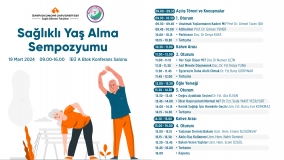
Healthy Aging Symposium
Moderated by the Department of Physiotherapy and Rehabilitation, Faculty of Health Sciences, Izmir University of Economics, Faculty of Health Sciences, in cooperation
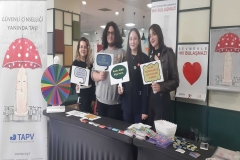
Are you aware? HIV/AIDS
HIV/AIDS Awareness Week events, prepared with the contributions of İzmir University of Economics Faculty of Medicine, Faculty of Health Sciences, and EKOKAM,
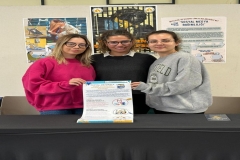
Digital Addiction Stand
A stand was established by the students of the Department of Nursing, Faculty of Health Sciences, Izmir University of Economics, on November
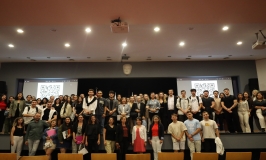
2023-2024 Academic Year Faculty of Health Sciences Opening Lecture
Izmir University of Economics Faculty of Health Sciences 2023-2024 Academic Year Opening Lecture titled 'Relationship between Cancer and Nutrition from Antiquity to

‘Surgical nursing’ summit in Kuşadasi
The ‘Congress of the Turkish Society of Surgical and Operating Room Nurses’, which will be organized internationally this year with the cooperation
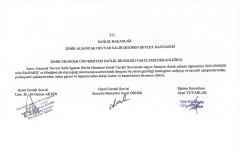
Internship Success from Our Students
Dilara Kına and Sıla Barış, our students from the nursing department, were given a certificate of appreciation for their professional approach, outstanding
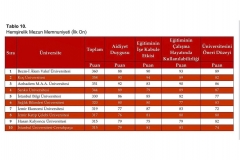
Satisfaction of Our Graduates
We are ranked 7th among Nursing programs in the University Research Laboratory (Uniar)'s graduate satisfaction 2023 report. Thank you to our alumni
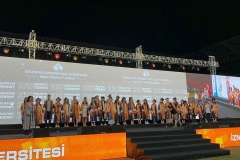
Our 2022-2023 Academic Year Graduation Ceremony
İzmir University of Economics 2023 graduation ceremony was held at Göztepe Gürsel Aksel Stadium, dedicated to the 100th anniversary of our republic.

